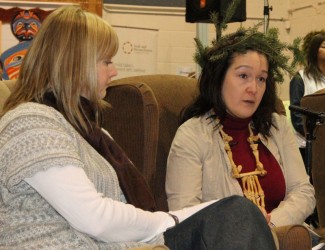Article Origin
Volume
Issue
Year
One of the most powerful speakers of the two-day Truth and Reconciliation Commission hearings held in Port Alberni March 12 and 13 was Yanny Barney, who never went to residential school but who is a survivor nonetheless.
The intergenerational effects of the residential school system grew vivid in the minds of all in attendance with her public statement.
“I was raised by residential school survivors,” she began.
Fear was the dominant emotion that ruled young Yanny’s †life, she said; fear of rage, the only emotion her own father was comfortable with; fear of threats; fear of a cousin who was molesting Yanny and her twin sister Moira while they were in the care of an aunt; and fear of the violence that was prevalent in that home.
“We were only getting what they were getting day-to-day in those residential schools,” Yanny has come now to understand.
Yanny said that while she never stepped foot in a residential school, those “horrible institutions” had a severe and lasting impact on her. It left her suffering from depression, with abandonment issues, a lack of self-worth, a lack of trust, a lack of the sense of belonging she wanted so badly.
Yanny described being bounced around among family members as her father juggled work in a logging operation with the demons that developed as a result of his time in Alberni Indian Residential School.
After being apprehended by the ministry, the twins were put in foster care with an aunt, who had also been a student in AIRS.
“Our day to day life was ruled with militant fear,” she said. Yanny and her sister would show up on the public school grounds hours early just to be away from an abusive home environment. Other school children would call her crybaby because she was an “emotional mess.” She said she was dealing with so much at home her emotions were on the surface so every little thing caused her to weep.
By the age of 11, the twins had lost their mother, were removed from their father, were abused by family, and then torn from their culture when placed with a white family in foster care.
“I feel I was robbed of a childhood, because of the trauma,” Yanny said as her sister sat with her holding her hand.
Yanny laments not knowing her language, but beyond having it withheld from her, she said the language was a tool used against her, only hearing it when relatives were complaining about the girls.
Yanny described herself as a musical soul, having been in choirs and bands. Not having her cultural songs and dances “is a pain” and something that could have been important to her healing process, she said.
Another legacy of the schools was the fractured families and communities. This is an example of “how successful those schools were,” Yanny said.
She discussed the important parallels of the residential school system and the foster system where, in Canada, 30 per cent of the children in care are Aboriginal despite representing only 3.5 per cent of the country’s population.
“The injustices of residential school has found a reincarnate,” Yanny said.
Disappointment was also another emotion that she carried with her.
She said she didn’t have many memories of that time, but the “most visceral” was “for our father’s visits. The excitement, hope and joy for his treasured visits turning to fear, disappointment and anguish as we waited for his arrival.” She said he was often self-medicating in a bar and would never show up, drowning his own pain and guilt and his failures as a father.
Yanny Barney said she hoped the result of the hearings will be a greater understanding of the intergenerational bondage that still exists because of the schools, and that the cycle of violence and abuse will stop so that other children can grow up without the same fear and pain endured by her sister and herself.
Throughout the hearings, residential school survivors apologized to their children for their shortcomings as parents, unable to hug or express love, for being stern, remote, and unavailable. And in many cases, their children sat with them, supporting their parents’ statements, learning why the residential school legacy continues to reverberate through the generations.
- 3393 views

